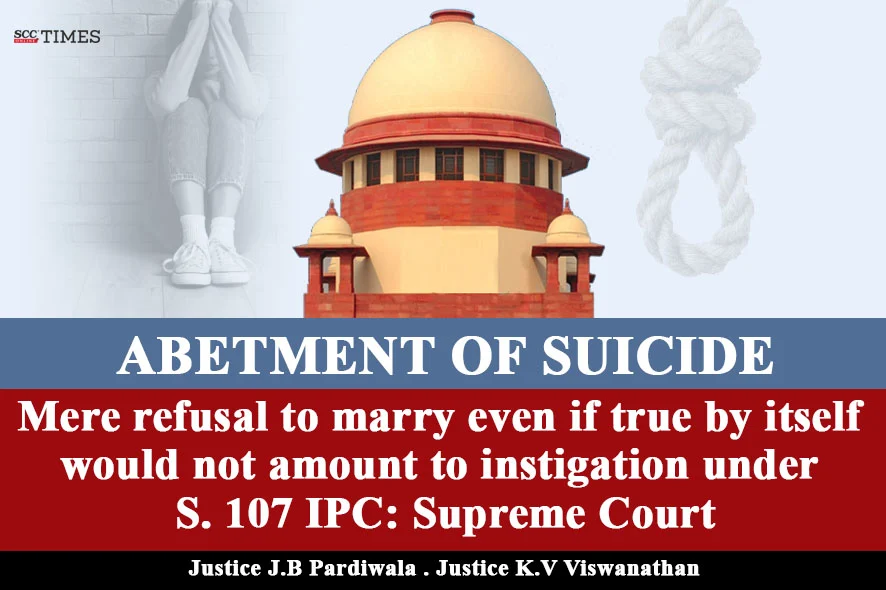Supreme Court: In an appeal filed against the Judgment passed by the Punjab and Haryana High Court , wherein petition filed by the appellant-accused under Section 482 of the Criminal Procedure Code, 1973 (‘CrPC’) seeking quashing of the First Information Report for the offence punishable under Section 306 of the Penal Code, 1860 (‘IPC’) was rejected, the division bench of JB Pardiwala and KV Viswanathan, JJ. held that mere refusal to marry does not constitute abetment of suicide. The Court noted that even if the accused had declined to marry the deceased due to family opposition, it could not be said that he had instigated or intended her suicide.
Expressing regret over the loss of a young life, the Court reiterated that judicial decisions must rest on evidence and law, not emotion. Holding that continuing the criminal proceedings would amount to a travesty of justice, the Court allowed the appeal and quashed the FIR and all related proceedings pending before the Sessions Court, Amritsar.
Background
In 2016, the mother of a deceased woman lodged an FIR alleging that her daughter, who was employed as a government advocate, had consumed poison and died by suicide. The complaint stated that the accused had promised to marry the deceased but later reneged on his assurance, causing her severe mental distress. The prosecution contended that the accused had “betrayed” the deceased after assuring her that he would persuade his family to consent to their marriage. On these allegations, the accused was charged with abetment of suicide under Section 306 read with Section 107 of the IPC.
Issue
Whether the accused could be said to have abeted the commission of suicide by the deceased.
Analysis and Decision
The Court noted that two days after the registration of the FIR, the mother of the deceased gave a supplementary statement before the police under Section 161 of the CrPC. On a plain reading of the supplementary statement recorded two days after the FIR, it was apparent that the complainant had improved upon her earlier version as narrated in the FIR and had alleged mental and physical exploitation of her deceased daughter by the accused.
From the materials on record, the Court noted that the accused and the deceased had shared an intimate relationship and were desirous of getting married, particularly the deceased. It also appears from the evidence on record that there was lot of opposition at the end of the family of the accused insofar as marriage with the deceased was concerned.
The Court noted that it is evident from the evidence on record, that as the accused was reluctant to get married to the deceased, she took the extreme step of consuming poison at her own house and ultimately succumbed. In such circumstances, referred to above, the mother of the deceased lodged the FIR, alleging that her daughter was betrayed by the accused as he declined to marry her.
The Court said that the first informant, i.e., the mother of the deceased, although duly served with notice issued by the Court, had chosen not to appear and contest the appeal.
The Court further observed that the legal position regarding the offence of abetment of suicide was well settled. Even if the prosecution’s case was accepted in its entirety, without any addition or subtraction, none of the essential ingredients to constitute the offence of abetment under Section 306 of the IPC were made out.
The Court also referred to its earlier decision in Nipun Aneja v. State of Uttar Pradesh, 2024 SCC OnLine SC 4091, wherein the principles governing the law of abetment were succinctly explained.
The Court highlighted that the ingredients necessary to constitute an offence under Section 306 of the IPC would stand fulfilled only if the suicide had been committed by the deceased as a result of direct and compelling encouragement or incitement by the accused, leaving the deceased with no other option but to take her own life. The Court emphasised that the act of instigation, as alleged, must be carried out with the intention of driving the deceased into such a situation that she felt compelled to commit suicide
The Court concluded that, in the present case, even if it was accepted that the accused due to opposition and pressure from his family, had declined to marry the deceased, it could not be said that he had created a situation in which the deceased was left with no other option but to commit suicide. The accused could not be held to have intended the consequence of his conduct, namely, the deceased’s suicide.
The Court observed with regret that a young woman had taken the extreme step of ending her life, possibly out of emotional distress or hurt feelings. However, it emphasised that judicial decisions must rest on evidence and legal principles rather than on sympathy. Mere refusal to marry, even if true, did not amount to “instigation” as defined under Section 107 of the Penal Code.
The Court held that subjecting the accused to trial on the basis of the available evidence would amount to a travesty of justice and that such a trial would serve no purpose. Accordingly, the appeal was allowed. The FIR was quashed, along with all consequential proceedings pending before the Court of the Additional Sessions Judge, Amritsar, Punjab.
[Yadwinder Singh @Sunny v. State of Punjab, 2025 SCC OnLine SC 2332, decided on 27-10-2025]
Advocates who appeared in this case:
For Petitioner(s): Mr. P. S. Patwalia, Sr. Adv., Ms. Deveshi Chand, Adv., Mr. Agam Aggarwal, Adv., Mr. Chritarth Palli , AOR
For Respondent(s): Mr. Karan Sharma, AOR





